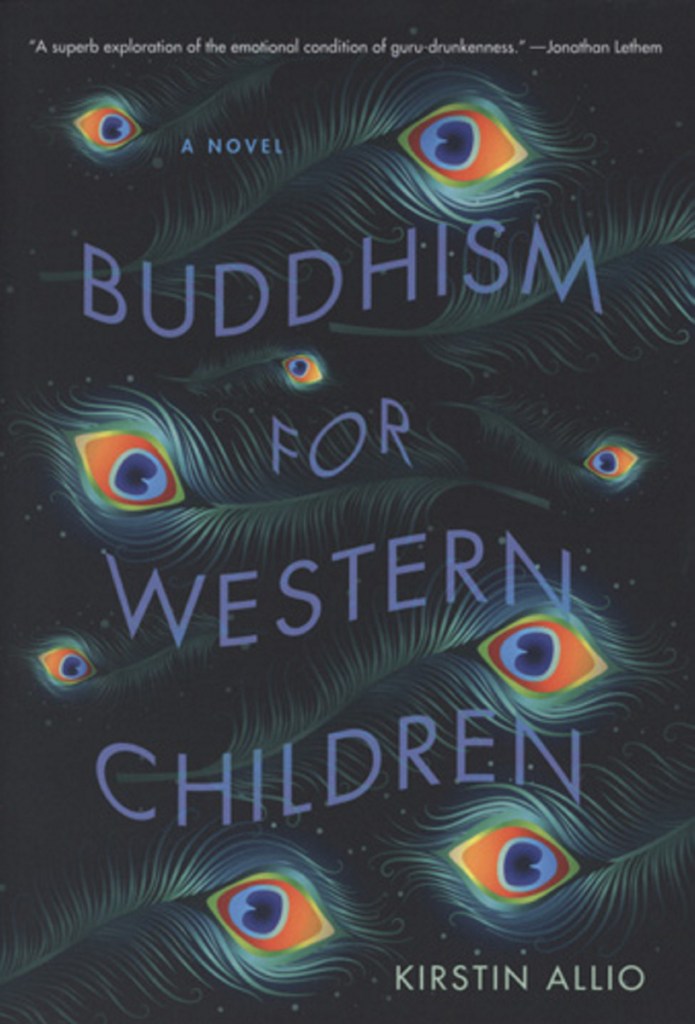Kirstin Allio’s last book, “Clothed, Female Figure,” was a collection of short stories grounded in the reality of complex, everyday women. Her new book, “Buddhism for Western Children,” couldn’t be more different, and showcases her versatility in style and language as well as subject matter.
“Buddhism for Western Children” is based in part on the author’s own childhood experiences belonging to a cultlike community of enlightenment seekers. In a 2016 essay in LitHub, Allio wrote that she was only 5 when her parents “found their Crazy Wise Man, all follicles and cells Orgasmic with Awakenment and Realization.” In her novel, the protagonist, Daniel, is 10 when his life is uprooted, and whereas Allio’s parents took her and her sister from Maine to California to join their Crazy Wise Man, Daniel’s parents bring him from Halifax, Nova Scotia, to a crumbling, dusty farm on the coast of Maine to join their Guru, the Avadhoot Master King Ivanovich. The Guru is a large, grizzled man, bearlike, his teachings largely improvised, half-formed thoughts that draw on a mediocre understanding of various Eastern philosophies. One of his more coherent moments reads:
“You are all living together / in the skull-shell of the Guru. / You are echoes of each other, / and yet it is too crowded to really echo. / I can hear everything, Jubal, / and I will listen to all you have to tell Me.”
When Daniel and his parents have been at the Guru’s sanctuary for a couple years, Daniel is renamed Jubal by the Guru, a rare privilege, and is tasked with collecting the followers’ Leelas. Leela, also spelled lila, is a Sanskrit word that translates variously to play, sport, spontaneity or drama, and that, according to the Encyclopedia Britannica, is a Hindu term with “several different meanings, most focusing in one way or another on the effortless or playful relation between the Absolute, or Brahman, and the contingent world.”
The Guru twists this term, focuses it in on himself (or Himself, as the language of the book would describe Him), as he does many other concepts that come from complex, rich and ancient belief systems. Leelas in this novel refer to the Guru’s followers’ origin stories, the ways they found and joined him. In other words, now 12-year-old Jubal, né Daniel, is tasked with becoming the consummate listener, carrying the pain and suffering and sadness that has led the followers to this strange place.
The Guru’s Sanctuary is a terribly confusing place, based on the whims of the USSR-born, piano prodigy Guru, who has his followers do “Service” in the form of menial jobs to keep the farm working. He also makes them pay tithes in any way they can; prevents them from sleeping; requires hourslong meditation sessions; and has nine wives, some of whose jobs include wiping his bottom, cleaning out his ears or keeping him clean-shaven. Ultimately, the Guru is a ridiculous figure – to us, the readers.
But this is part of the point, of course: Cults almost always seem absurd from the vantage point of those who have never been sucked into them. But the reason cult leaders hold such terrifying power over both the people beholden to them and the cultural imagination at large is that, for whatever reason, their charisma, charm and manipulative abilities actually work. As Jubal listens to the Leelas, we begin to learn of the often mundane circumstances that led so many people to this place, as well as the worldly attachments they still have, despite the Guru’s requirement that they leave such things behind.
In the novel’s second half, the now 17-year-old Jubal speaks for himself, the narrative switching from third to first person. In this half, Jubal escapes and drives a truck stolen from the Sanctuary to Santa Fe, where he is eventually required to talk to a therapist, and he begins trying to untangle the other cult members’ stories that he’s been carrying within him for so long.
While the novel’s language is gorgeous and often poetic, the scenes are erratic and jump around: “There was the Period of the No Seen Thing. Nothing came of it. Jubal turned fifteen. Daterolls, Dad Ray with a screwball, vodka was a way for some of the men to laugh at their screwy screwy selves again, said the Guru. Or was it a screwdriver? His hair had gotten darker. Closer to black, now. His eyebrows were suddenly coarser, so that his eyes seemed shy.”
While the book can be frustrating to read at times, the effect is clearly deliberate, the form conveying Jubal’s own confusion, his inability to separate one day from the next, and, ultimately, the way he buys into the Guru’s teaching for years. How could he not, raised as he is in this strange, starving community? The second half of the novel includes some extremely satisfying reveals, and so, as difficult as “Buddhism with Western Children” can be at times, keep going.
Ilana Masad is a book critic and fiction writer working on her Ph.D. at the University of Nebraska-Lincoln. Her work has appeared in The New Yorker, StoryQuarterly, Broadly, the Washington Post, the Los Angeles Times and more.
Send questions/comments to the editors.



Comments are no longer available on this story